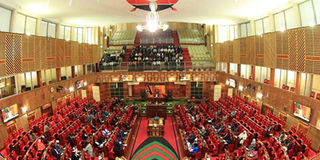Tough times as MPs agree to repeal interest caps

Members of the National Assembly in a past session. PHOTO | FILE | NATION MEDIA GROUP
What you need to know:
- The MPs passed the 2019 Finance Bill, after throwing out an amendment by the Treasury that sought to repeal the 2016 Banking (Amendment Act).
- In 2016, the National Assembly imposed caps on commercial lending rates at four percentage points above the benchmark Central Bank rate to cushion Kenyans against exploitation and high loan costs.
- That, however, did not get down well with the banks.
Kenyans should brace themselves for expensive loans after a parliamentary committee agreed with President Uhuru Kenyatta that the interest capping law be repealed.
The decision by the National Assembly Finance and National Planning Committee is in line with the President’s recommendations in an October 16 memorandum sent to the House, detailing the reasons for his refusal to sign into law the 2019 Finance Bill.
COMMERCIAL BANKS
In an amendment to section 33 B of the Banking Act, lawmakers wanted to have the caps maintained and only sought to have the law amended to align it with a High Court ruling.
But even as the MPs threw in the towel – effectively hauling small and medium enterprises and ordinary Kenyans under the bus – they want the Mr Kenyatta's text in the memo amended so that those already servicing loans or in agreement with lending institutions for loans under the repealed regime, are not affected.
“Notwithstanding the repeal of section 33 B, any agreement or arrangement to borrow or lend which was made or entered into...shall continue to be in force on such terms, including interest rates and for the duration specified in the agreement or arrangement,” the report tabled in the House Tuesday, proposes.
The MPs passed the 2019 Finance Bill, after throwing out an amendment by the Treasury that sought to repeal the 2016 Banking (Amendment Act).
In 2016, the National Assembly imposed caps on commercial lending rates at four percentage points above the benchmark Central Bank rate to cushion Kenyans against exploitation and high loan costs.
That, however, did not get down well with the banks.
They blamed the law for stifling the growth of small banks and hurting private-sector lending while making it easier for the government to borrow from the domestic market.
But even as the committee chaired by Kipkelion East MP Joseph Limo proposes an amendment to the president’s reservation on the bill, the onus lies with House Speaker Justin Muturi.
Mr Muturi would be required to make the determination on whether any proposed amendments in light of the President’s reservations either fully accommodate Mr Kenyatta's reservations or do not fully accommodate the reservations.
According to standing orders, the assembly may, in considering the bill a second time, propose amendments in light of the President’s reservations.
Where the amendments do not fully accommodate the reservations, the assembly can pass the bill by a vote supported by two-thirds or at least 233 of the 349 lawmakers.
But where the amendments fully accommodate the reservations of the President, the voting is by a simple majority.
It would not be the first time the Speaker is making this kind of determination.
It happened when the MPs were considering the President’s reservations on the Ethics and Anti-Corruption Commission Bill and the Health Laws (Amendment) Bill.
In both instances, the Speaker deemed that the amendments introduced by the House Committees fully accommodated the President’s wishes and were passed by a simple majority.
If the MPs amend the bill as proposed by Mr Kenyatta, it will have an effect on interest rates and the market for loanable funds.





